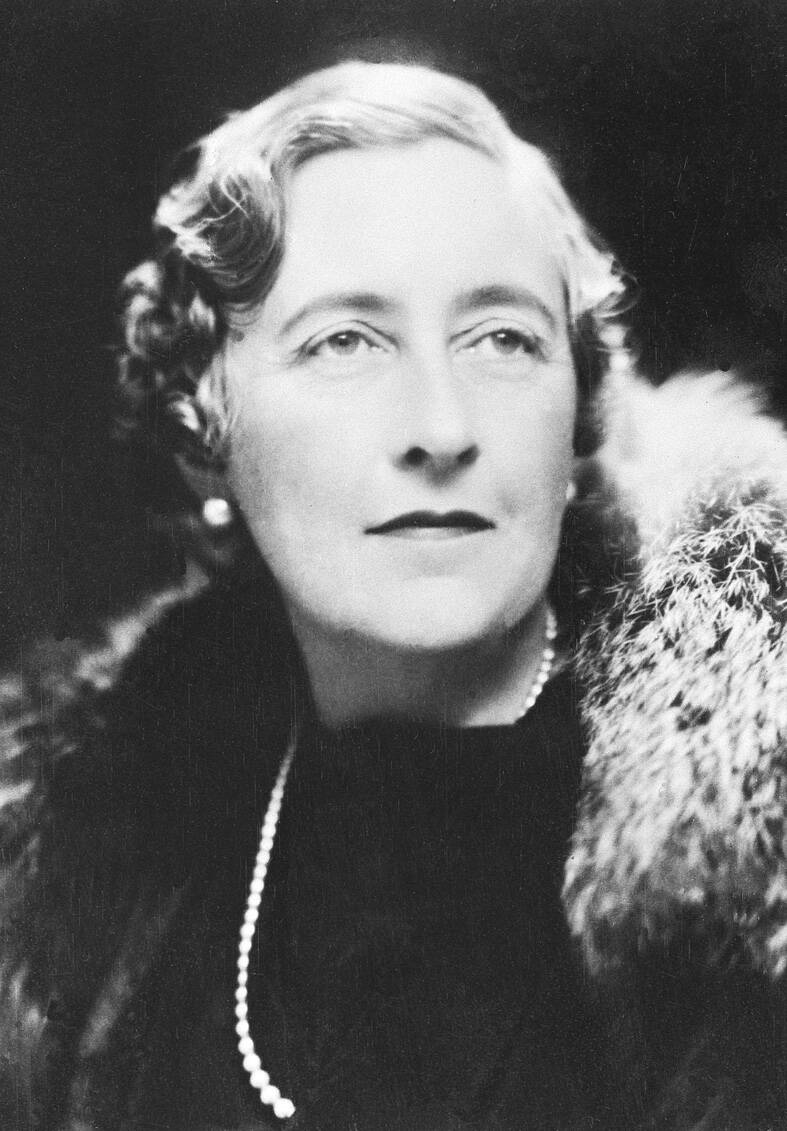Agatha Christie’s 1930s typewriter and the manuscript of her final Hercule Poirot novel, which was kept for decades in a bank vault, yesterday went on display in a new exhibition delving into the “dark stuff” at the heart of crime fiction.
The cover of the faded and fragile manuscript has the book’s title Curtain written in capital letters in Christie’s own hand along with her name and address — Greenway House in Devon, southwest England — in spidery longhand.
“She wrote it as a nest egg for her daughter Rosalind, ‘something to cheer you up when you come back from the funeral,’” said crime novelist Nicola Upson, curator of the “Murder by the Book” exhibition at Cambridge University Library in central England.

Photo: AP
The last Poirot mystery, in which Christie’s fabled Belgian detective dies, was written in the early 1940s during World War II in case she did not survive.
At the time “nothing was guaranteed,” Upson said.
Christie actually went on to write many more Poirot novels before she died in 1976, but with the final installment already written, fears Poirot’s demise might be leaked dictated that the manuscript be kept under lock and key.

Photo: 20th Century Studios via AP
“It’s Poirot’s last case and she wanted that to come out after her own death and for the royalties from it to benefit her daughter,” Upson said.
Poirot’s fate, when it was finally revealed in 1975, was seen as so culturally significant it was marked by a front page obituary in the New York Times.
“It ended up being published four months before her own death in January 1976, so when you read Poirot’s final words in that book they do read a bit like Christie’s farewell to her readers, there’s a poignancy to it,” Upson said.
Christie, who also wrote the Miss Marple series, is the best-selling fiction author of all time. She sold an astonishing 300 million books during her lifetime.
Nearly half a century after her death, objects such as her clunky 1950s Dictaphone and portable 1937 Remington typewriter — on which she would have written one of her most famous works And Then There Were None — still have the power to fascinate.
“There is something so evocative about the first to witness all those thoughts and stories,” said Upson, author of the Josephine Tey series of mysteries.
The exhibition draws on the library’s 1 million-strong fiction collection of first editions — still in their original dust jackets — by highlighting nearly 100 of the most famous, influential and best-selling crime novels in UK history.
Upson said she wanted to look not just at the “so-called cosy mysteries,” but also “the dark stuff, the kind of nuts and bolts of crime fiction which is after all violence and death.”
Forgotten classics also feature such as A Pin to See the Peepshow by F. Tennyson Jesse, which was inspired by the conviction and 1923 execution of Edith Thompson and Frederick Bywaters.
In Jesse’s 1934 novel, protagonist Julia Almond meets a similar fate in an ordeal described as amongst the “most horrific in all crime fiction.”
The book was influential in the UK’s abolition of the death penalty for murder three decades later in 1969.
As well as early fictional characters such as Miss Marple, Poirot and Arthur Conan Doyle’s Sherlock Holmes, the exhibition also features more recent creations such as Lynda La Plante’s Jane Tennison and Colin Dexter’s Inspector Morse.
Despite changes in style over the decades Upson said the essentials of good crime writing remain the same: “Strong characters ... a really realistic, atmospheric world ... and a strong story with a beginning middle and end, not necessarily in that order.”

MULTIFACETED: A task force has analyzed possible scenarios and created responses to assist domestic industries in dealing with US tariffs, the economics minister said The Executive Yuan is tomorrow to announce countermeasures to US President Donald Trump’s planned reciprocal tariffs, although the details of the plan would not be made public until Monday next week, Minister of Economic Affairs J.W. Kuo (郭智輝) said yesterday. The Cabinet established an economic and trade task force in November last year to deal with US trade and tariff related issues, Kuo told reporters outside the legislature in Taipei. The task force has been analyzing and evaluating all kinds of scenarios to identify suitable responses and determine how best to assist domestic industries in managing the effects of Trump’s tariffs, he

TIGHT-LIPPED: UMC said it had no merger plans at the moment, after Nikkei Asia reported that the firm and GlobalFoundries were considering restarting merger talks United Microelectronics Corp (UMC, 聯電), the world’s No. 4 contract chipmaker, yesterday launched a new US$5 billion 12-inch chip factory in Singapore as part of its latest effort to diversify its manufacturing footprint amid growing geopolitical risks. The new factory, adjacent to UMC’s existing Singapore fab in the Pasir Res Wafer Fab Park, is scheduled to enter volume production next year, utilizing mature 22-nanometer and 28-nanometer process technologies, UMC said in a statement. The company plans to invest US$5 billion during the first phase of the new fab, which would have an installed capacity of 30,000 12-inch wafers per month, it said. The

Taiwan’s official purchasing managers’ index (PMI) last month rose 0.2 percentage points to 54.2, in a second consecutive month of expansion, thanks to front-loading demand intended to avoid potential US tariff hikes, the Chung-Hua Institution for Economic Research (CIER, 中華經濟研究院) said yesterday. While short-term demand appeared robust, uncertainties rose due to US President Donald Trump’s unpredictable trade policy, CIER president Lien Hsien-ming (連賢明) told a news conference in Taipei. Taiwan’s economy this year would be characterized by high-level fluctuations and the volatility would be wilder than most expect, Lien said Demand for electronics, particularly semiconductors, continues to benefit from US technology giants’ effort

‘SWASTICAR’: Tesla CEO Elon Musk’s close association with Donald Trump has prompted opponents to brand him a ‘Nazi’ and resulted in a dramatic drop in sales Demonstrators descended on Tesla Inc dealerships across the US, and in Europe and Canada on Saturday to protest company chief Elon Musk, who has amassed extraordinary power as a top adviser to US President Donald Trump. Waving signs with messages such as “Musk is stealing our money” and “Reclaim our country,” the protests largely took place peacefully following fiery episodes of vandalism on Tesla vehicles, dealerships and other facilities in recent weeks that US officials have denounced as terrorism. Hundreds rallied on Saturday outside the Tesla dealership in Manhattan. Some blasted Musk, the world’s richest man, while others demanded the shuttering of his